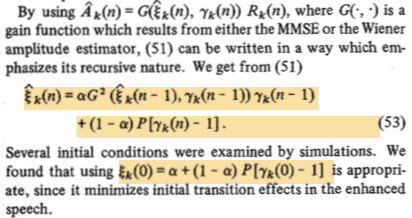I am reading this paper about speech enhancement using a minimum mean square error short time spectral amplitude estimator for our speech enhancement project. Basically in the paper they mix a clean speech with noise and try to recover the clean speech.
The paper keeps mentioning a priori SNR and a posteriori SNR. I am confused by what does it mean. A priori SNR is the SNR from before the mixing? But that can't be right. If we knew the clean speech signal from the beginning this exercise would be pointless.
This is the paper if you are wondering: Y. Ephraim and D. Malah, “Speech Enhancement Using a- Minimum Mean Square Error Short-Time Spectral Amplitude Estimator”, IEEE Transactions on Acoustics, Speech, and Signal Processing, Vol. ASSP-32, No. 6, Dec. 1984.
thanks

